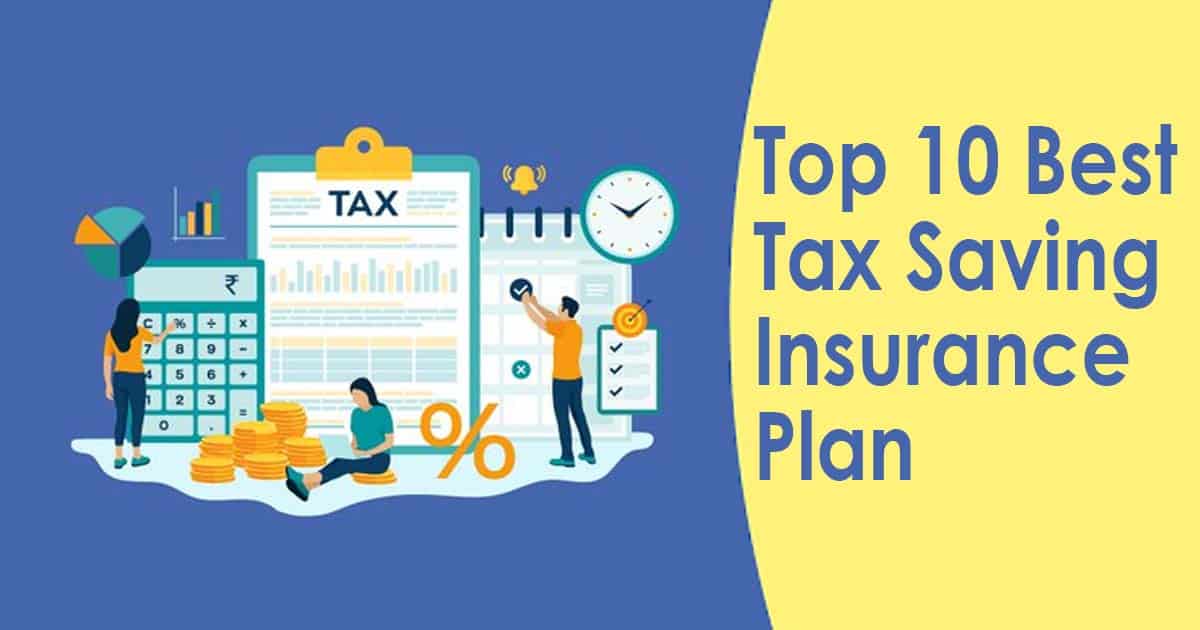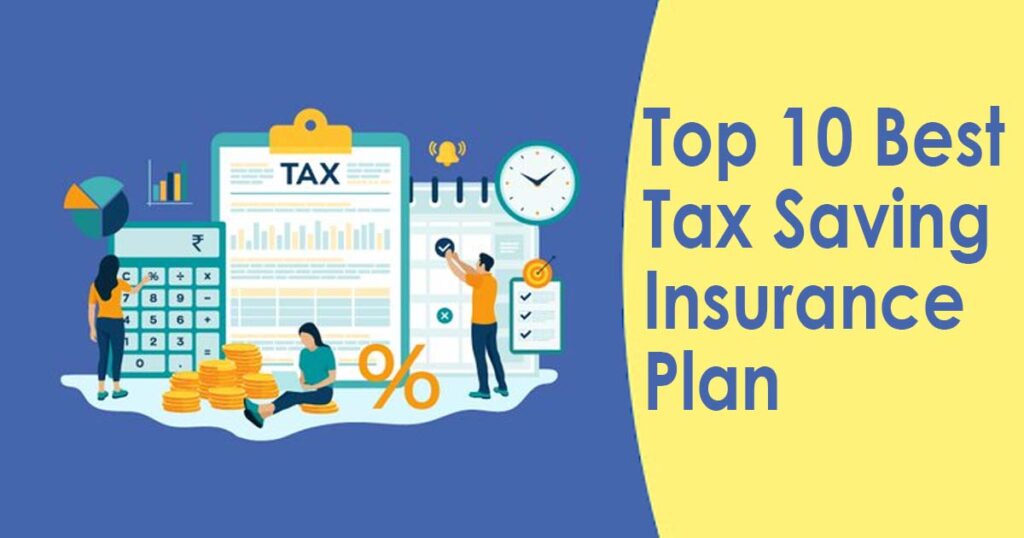Saving money is a habit that almost everyone has and serves as our financial safety net for the future. Yes, managing savings can be more difficult for some people than others, they are need Best Tax Saving Insurance Plan for their Saving.
Your savings may be used to pay for your dream home, your dream car, or your child’s higher education. Your ability to save money is essential to meeting your family’s expanding needs. Many people begin making contributions to their retirement fund as soon as they receive their first pay check.
In order to save money for an even better future, we make sacrifices with our spending today. However, there is a factor called “tax” that significantly reduces your savings.

Many people frequently become entangled in this tax saving insurance plan. Each and every person dreads the tax filing season. People are currently in a frenzy over how much tax they will have to pay this time of year. Particularly for those who have only recently begun to earn a living, it can be overwhelming. However, given that taxes are being paid with your money, you must comprehend the complexities.
The Top Few Best Tax Saving Insurance Plan are listed below.
1. Fixed deposit
By making investments in tax-saving fixed deposits, you can reduce your tax liability in accordance with Section 80C of the Indian Income Tax Act, 1961. By making investments in tax-saving fixed deposits, you can deduct up to Rs. 1.5 lakh from your income. Such FDs have a 5-year lock-in period, and the interest received is taxable.
Typically, interest rates fall between 5.5% and 7.75%. These fixed deposits are a safe investment option, as they are offered by Indian banks and protected by the Deposit Insurance and Credit Guarantee Corporation (DICGC). However, it is important to note that premature withdrawal from these FDs carries a penalty fee, which varies depending on the bank’s policies.”
2. PPF (Public Provident Fund)
The Public Provident Scheme is a well-liked investment tool for tax reduction. A PPF account must first be opened at the post office or specific branches of public and private sector banks. It is a long-term savings and investment product. A guaranteed rate of interest is earned on contributions to the PPF account. These deposits are eligible for Section 80C deductions worth up to Rs 1.5 lakh per fiscal year.
Although PPF accounts have a 15-year lock-in period, they do allow partial withdrawals starting in the seventh year. After the third year from account opening, PPF account holders can also apply for loans against the remaining balance in their account.
Read More: LIC Plan 5 Years Double Money – A Lucrative Investment Option
3. ULIP (Unit-Linked Insurance Plan)
ULIPs are long-term investment products that let you select from a variety of equity, debt, or both funds. With ULIPs, you have the freedom to switch between funds in accordance with your financial objectives. You can reduce your tax liability under sections 80C and 10(10D) of the Income Tax Act, 1961, by investing in ULIPs.
Additionally, ULIPs offer life insurance protection, which serves as a source of security for your family’s finances in the event of an unfortunate circumstance. Before investing in ULIPs, it’s crucial to read the policy document carefully to understand the fees and risks involved.
4. National Savings Certificate
National Savings Certificates are a savings bond programme that primarily encourages investors with low to moderate incomes to invest while reducing their income tax liability under Section 80C. If you have a savings account with a bank or a post office and have access to internet banking, you can purchase NSC certificates in e-mode. An investor may purchase NSCs for their own account, on behalf of a minor, or in a joint account with another adult.
A five-year lock-in period applies to investments made in NSC certificates, and the government periodically changes the interest rates. Investments carry a low level of risk, making them a popular choice for those looking to make short-term savings.
5. Senior Citizen Savings Scheme
The Senior Citizen Savings Scheme (SCSS) is a government-sponsored savings programme for people over 60. It provides a reliable and secure source of income for people’s post-retirement years and offers relatively high returns. Section 80C of the Income Tax Act of 1961 permits tax deductions for principal deposits made into SCSS accounts up to a maximum of Rs. 1.5 lakh.
6. Life insurance
Life insurance is a crucial component of a person’s financial plan because it provides security to the person’s family in the event of an untimely death. As a result, the primary duty to secure the family’s financial future rests with the breadwinner. Traditional life insurance (endowment) and market-linked life insurance (ULIP) both provide tax advantages to policyholders on the premiums paid. Various life insurance programmes exist, including: Plans for life insurance give policy holders tax advantages regardless of their nature.
Section 80C of the Income Tax Act covers life insurance premiums up to a maximum of Rs. 1.5 lakh. Under Section 10, proceeds on death or maturity are tax-free (D). If the policy is terminated or surrendered within five years, the claimed deductions are added to the income and are taxed accordingly. Plans for the long term Planned endowments, or ULIPs, or unit-linked
7. Pension plans
Pension plans are another form of life insurance. They serve a different end-objective from other insurance plans like term plans and endowment plans, which are called protection plans. While protection plans are geared to financially secure the individual’s family on his death, pension plans aim at providing for the individual and his family if he lives on.
Contributions towards a pension are covered under Section 80CCC (a sub-section under Section 80C) of the Income Tax Act. The aggregate limit of deductions under all the sub-sections of Section 80C cannot exceed Rs 1.5 lakh.
On maturity, 1/3rd of the accumulated pension amount is tax-free, with the balance (2/3rds) treated as income and taxed at the marginal tax rate. The amount is tax free upon the death of the beneficiary.
8. Health insurance or Mediclaim
The costs associated with an accident or hospitalization are covered by health insurance, or Mediclaim, as it is more commonly known. In accordance with the sum assured, Mediclaim also covers pre- and post-hospitalization costs. Section 80D of the tax code provides benefits for health insurance.
Tax benefits are available on insurance premiums up to Rs 20,000 for senior citizens and Rs 15,000 for everyone else. The policyholder can claim a tax benefit of Rs 35,000 (Rs 15,000 + Rs 20,000) if he pays Rs 15,000 for his own policy and Rs 20,000 for his senior parent’s policy. For amounts received under critical illness insurance policies, the maturity value is tax-free.
9. NPS
The PFRDA, or Pension Funds Regulatory and Development Authority, oversees the NPS, or New Pension Scheme. It is open to all Indian citizens between the ages of 18 and 60. Due to the low fund management fees, it is very economical. Three distinct accounts with three different asset profiles are managed by the fund managers: one for equity (E), one for corporate bonds (C), and one for government securities (G).
Investors have the option of actively managing their portfolios or passively (auto choice). Under Section 80CCD of the Income Tax Act, contributions made to the NPS are tax deductible. Together with Sections 80C and 80CCC, this section’s combined deduction cap cannot exceed Rs 1.5 lakh. Given the variety of choices, NPS is especially helpful.
10. Tax-saving mutual funds
Equity-linked savings schemes (ELSS), another name for tax-saving mutual funds, are eligible for tax advantages. Tax-saving mutual funds are better suited for investors with a medium to high risk tolerance because they invest in stocks as well as other assets. For three years, investments are locked in. Under Section 80C of the Income Tax Act, investments in tax-saving mutual funds are allowed up to Rs 1.5 lakh.
Section 10(D) provides that proceeds on death or maturity are tax-free. The three-year lock-in period with tax-saving mutual funds is a benefit for investors looking to reduce their tax burden. These investments are wise choices because they don’t require investors to pay taxes on their earnings.
Frequently Asked Questions (FAQ)
Do I have to pay taxes on the investments?
Whether you need to pay taxes depend entirely on the type of investment you are planning for the financial year. Below are few of the investment types you will be levied taxes on:
- Capital gains: You will be taxed when you sell some of your investments at a profit.
- Tax on interest: To save on this tax you need to careful while investing in funds/products. Some schemes are tax-free but there are times when some interest earned on some products are taxable.
- Dividends and other income types: Individuals need to pay interest on dividends in case of profits from selling the investments, rental and other forms of income they receive.
How many Best Tax Saving Insurance Plan can one have?
Individuals can buy as many Tax Saving Insurance Plan as they need as there is no limit to it. However, investors must not forget that there is a limit of deduction under which one can claim the tax benefits. To know these limits, you need to refer to different section of the Income Tax Act.
What is the maximum limit of investment under Section 80C?
The maximum limit of investment under Section 80C of the Income Tax Act, 1961 has been capped at Rs 1,50,000 from your total taxable income.
How can I reduce my tax legally?
Individuals can reduce their taxes legally by making investments in the government approved Tax Saving Insurance Plan.
How can I reduce my taxable income?
Individuals are always a look out for ways to save on paying tax. Below are the few ways to reduce your taxable income in India:
- Claim the expenses you have made to save income tax
- Invest in tax-saving instruments listed under Section 80C of Income Tax Act
- Avail tax deduction on your housing loan
- Money received from life insurance policy upon maturity or while receiving the claim amount is exempt from tax. The general rule is that premium should not exceed 20% of the sum insured for policies issued before 1 April, 2012. For policies post 1 April, 2012, the premium should not exceed 15%
- Keep a check on your long-term capital gains as 10% tax is applicable if it exceeds more than Rs 1 lakh
- A certain portion of money paid towards health insurance premium is not taxable under Section 80D. Additionally, premium paid for purchasing health insurance for the elderly can let you save more tax.
What deductions can I claim without receipts?
Although a receipt is preferred for every expense you make and want to claim on your tax return, there are few expenses you might be able to claim if the receipt is lost.
- Fuel or petrol expenses if you can explain the number of kilometres you are claiming
- Computer items if you can submit credit card statement and a note against it
- Stationery items if you can submit credit card statement and a note against it
- Membership fees if you have the documentation to prove it.
What tax exemptions can I get in India?
The Income Tax Act provides a taxpayer with a number of tax exemptions and deductions. Tax exemptions on housing rent allowance, leave travel allowance, Section 80C deductions, the standard deduction, Section 80D deductions, etc. are among the frequently used tax exemptions and deductions.
How can I maximise my tax refund?
Below are five tips to minimize your tax outgoing and maximising tax refund:
- Make the most of your Section 80C contributions because you can claim a tax benefit of up to Rs 1.5 lakh on expenses like student loans, PPF, national savings certificates, ELSS, and mortgages.
- Utilize Section 80D tax benefits by deducting medical insurance premium payments in addition to Section 80C benefits.
- Look into Section 80EE and Section 24 of the Income Tax Act’s tax benefits for home loans.
- In relation to interest earned on any savings account opened at a bank, post office, or cooperative society, taxpayers are permitted to deduct up to Rs 10,000 from their taxes.
- Even if your employer does not provide HRA, you may still claim a deduction for it under Section 80GG.







